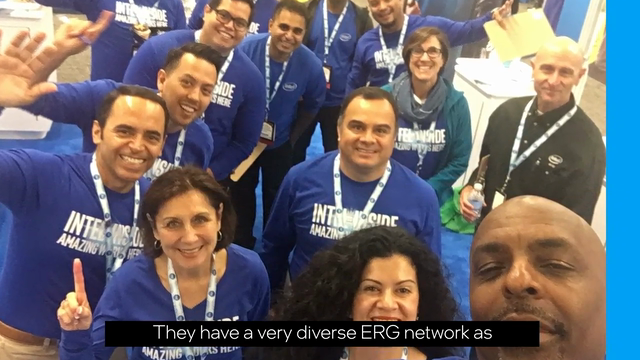From Young Immigrant To Intel VP: Xochitl Monteon Extends Her Hand To Help Women in STEM
Xochitl Monteon has lived most her life as an “only.” The only immigrant. The only Mexican. The only woman. Now, as a leader at Intel, she works to create an environment where diverse mindsets foster innovation.
A universal language
Born in Mexico, Xochitl (pronounced SOH-chee) was 4 years old when her family immigrated to San Jose, California. Her parents were migrant farm and tannery workers with an incredible work ethic and self-starter attitude, something they made sure to instill in their children.
Despite having very little formal education, her father dreamed that all his kids would one day graduate from college. At the same time, he emphasized the importance of helping others as you succeed (more on that later).
“I didn’t know a lick of English when I started my elementary school program,” Xochitl says. “That was before you had English as a second language, so it was a rough elementary school period.”
While she struggled with English, she found solace in the universal language of math — especially while helping her mother in the kitchen.
“In Mexico, you always pull out all your pinto beans, and then you start out with little rocks and the bad pinto beans,” Xochitl says. “So [my mother] would always leverage that as an opportunity to teach me addition, subtraction, and multiplication with the pinto beans at the kitchen table.”
As Xochitl grew up, she became fluent in English but always maintained her love for math. By the time she entered college, she had set her heart on metallurgical engineering, where she found herself one of only two women in the program.
She then transferred to San Jose State University, which didn’t have exactly what she was looking for in terms of academic focus. She worked with the deans of the science and engineering departments to create her own degree program focused on hazardous waste management — something she was increasingly passionate about after working a few internships with different semiconductor companies.
From acquisition to opportunity
Xochitl spent her early career in business operations before eventually shifting to information technology (IT). Working for a few Silicon Valley companies, she brought her experience to the Securities team at Intel in 2011.
“I pulled up into my first day of work at an acquisition that Intel had just made, and in the parking lot there was a big tent with an announcement that said, ‘Welcome to Intel.’” Xochitl says, “That was really my first day at the company.”
Working in Silicon Valley for so long, she grew accustomed to the expectation that every few years, you’d move on to a different company. It’s just what people did. But that all changed when she started working at Intel.
“There are always new projects to take on, new business problems to solve,” Xochitl says, “So there’s just a tremendous amount of opportunity within the company to be able to move up laterally or horizontally or across various business units. It’s been an amazing journey.”
Leading with a humble heart
Now, Xochitl works as vice president (VP) of Information Technology Governance and chief privacy officer (CPO).
As CPO, she works closely with the Cybersecurity team to ensure appropriate control of data assets. As VP, she provides the global supply chain with the tools and technology they need to help them succeed. Working in such a fast-paced environment, Xochitl has learned to approach leadership with a humble heart.
“You don’t need to be the smartest person in the room,” Xochitl says, “You need to be able to build the right team. You need to know what you need in order for the team to be successful and empower them.”
Finding a community at Intel
After her experience working for multiple Silicon Valley companies, Xochitl believes Intel has some of the best programs for women in the industry. Over the years, she’s joined numerous Employee Resource Groups (ERGs) that focus on women at Intel. Xochitl believes these groups help support women engineers and ensure they have the opportunity for a long-term career at Intel.
As part of Intel’s 2030 RISE Goals, Intel aims to exceed 40% representation of women in technical positions and double the number of women and underrepresented minorities in senior leadership roles.
“As you look at the RISE goals that we currently have within the organization,” Xochitl says, “the company’s focus on building talent and recognizing the value proposition behind having diversity of thought within the organization is something that I’m very proud to be a part of.”
Beyond discovering her own mentor through an ERG, she mentors six other women at Intel.
“My father was someone who believed that if you were doing better than someone else, you always lent a hand,” Xochitl says. “So, if there’s any tidbit or any guidance or direction I can give that might help someone in some way, then that’s what I want to do. It’s very fulfilling for me.”
A force multiplier for more
Having such a successful career as a woman in STEM, Xochitl’s advice to women in the workplace is to not be discouraged if you are in the minority. She believes the industry desperately needs more women, not just for representation, but for the different mindset and approach female engineers bring to the table.
“Having a very diverse team really brings about the right types of solutions,” says Xochitl, “and I’ve seen it in so many different situations over my career. There might be three of you in a class. You could be one in a group of 30, but that’s okay. I wouldn’t let the numbers scare you. You can be a force multiplier for more. I wouldn’t be afraid of it. I would take it head on, and I would really push yourself to leave a legacy.”
As far as Xochitl’s concerned, she’s not finished building her legacy.



